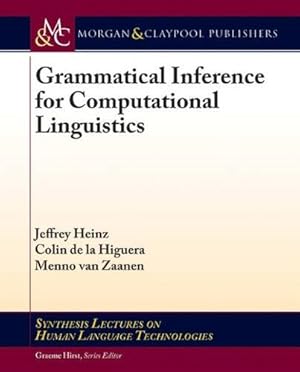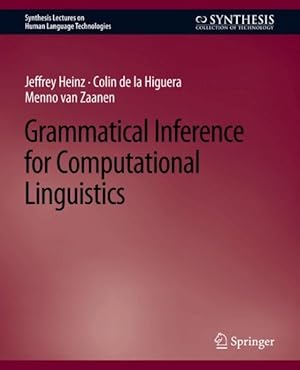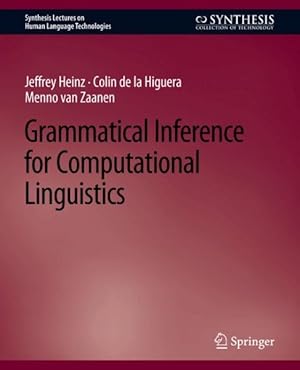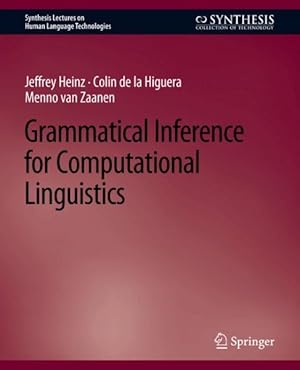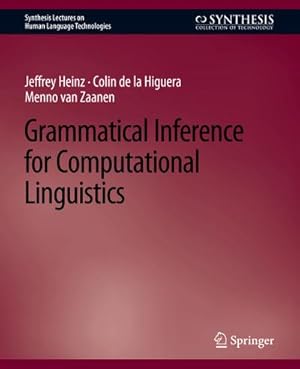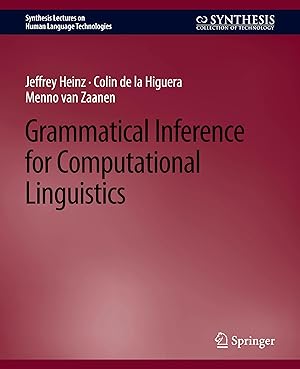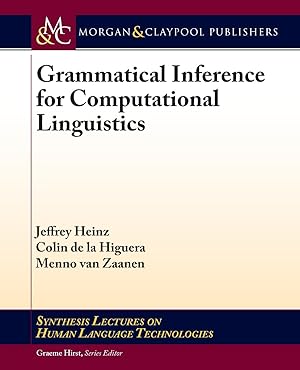grammatical inference computational linguistics de heinz jeffrey (18 resultados)
Filtros de búsqueda
Tipo de artículo
- Todos los tipos de productos
- Libros (18)
- Revistas y publicaciones (No hay ningún otro resultado que coincida con este filtro.)
- Cómics (No hay ningún otro resultado que coincida con este filtro.)
- Partituras (No hay ningún otro resultado que coincida con este filtro.)
- Arte, grabados y pósters (No hay ningún otro resultado que coincida con este filtro.)
- Fotografías (No hay ningún otro resultado que coincida con este filtro.)
- Mapas (No hay ningún otro resultado que coincida con este filtro.)
- Manuscritos y coleccionismo de papel (No hay ningún otro resultado que coincida con este filtro.)
Condición Más información
- Nuevo (14)
- Como nuevo, Excelente o Muy bueno (2)
- Bueno o Aceptable (1)
- Regular o Pobre (No hay ningún otro resultado que coincida con este filtro.)
- Tal como se indica (1)
Encuadernación
- Todas
- Tapa dura (No hay ningún otro resultado que coincida con este filtro.)
- Tapa blanda (18)
Más atributos
- Primera edición (No hay ningún otro resultado que coincida con este filtro.)
- Firmado (No hay ningún otro resultado que coincida con este filtro.)
- Sobrecubierta (No hay ningún otro resultado que coincida con este filtro.)
- Con imágenes (12)
- No impresión bajo demanda (13)
Idioma (1)
Precio
- Cualquier precio
- Menos de EUR 20 (No hay ningún otro resultado que coincida con este filtro.)
- EUR 20 a EUR 45
- Más de EUR 45
Gastos de envío gratis
Ubicación del vendedor
Valoración de los vendedores
-
Grammatical Inference for Computational Linguistics (Synthesis Lectures on Human Language Technologies)
Publicado por Morgan & Claypool Publishers, 2015
ISBN 10: 1608459772 ISBN 13: 9781608459773
Idioma: Inglés
Librería: WeBuyBooks, Rossendale, LANCS, Reino Unido
EUR 26,07
EUR 6,57 gastos de envío desde Reino Unido a Estados Unidos de AmericaCantidad disponible: 1 disponibles
Añadir al carritoCondición: Very Good. Most items will be dispatched the same or the next working day. A copy that has been read, but is in excellent condition. Pages are intact and not marred by notes or highlighting. The spine remains undamaged.
-
Grammatical Inference for Computational Linguistics
Librería: GreatBookPrices, Columbia, MD, Estados Unidos de America
EUR 37,97
EUR 2,30 gastos de envío en Estados Unidos de AmericaCantidad disponible: Más de 20 disponibles
Añadir al carritoCondición: New.
-
Grammatical Inference for Computational Linguistics (Paperback or Softback)
Librería: BargainBookStores, Grand Rapids, MI, Estados Unidos de America
EUR 40,34
Gratis gastos de envío en Estados Unidos de AmericaCantidad disponible: 5 disponibles
Añadir al carritoPaperback or Softback. Condición: New. Grammatical Inference for Computational Linguistics. Book.
-
Grammatical Inference for Computational Linguistics
Librería: GreatBookPrices, Columbia, MD, Estados Unidos de America
EUR 41,94
EUR 2,30 gastos de envío en Estados Unidos de AmericaCantidad disponible: Más de 20 disponibles
Añadir al carritoCondición: As New. Unread book in perfect condition.
-
Grammatical Inference for Computational Linguistics (Synthesis Lectures on Human Language Technologies)
Librería: Ria Christie Collections, Uxbridge, Reino Unido
EUR 39,91
EUR 13,60 gastos de envío desde Reino Unido a Estados Unidos de AmericaCantidad disponible: Más de 20 disponibles
Añadir al carritoCondición: New. In English.
-
Grammatical Inference for Computational Linguistics (Synthesis Lectures on Human Language Technologies)
Librería: Books Puddle, New York, NY, Estados Unidos de America
EUR 51,87
EUR 3,47 gastos de envío en Estados Unidos de AmericaCantidad disponible: 4 disponibles
Añadir al carritoCondición: New. 1st edition NO-PA16APR2015-KAP.
-
Grammatical Inference for Computational Linguistics
Librería: Chiron Media, Wallingford, Reino Unido
EUR 37,49
EUR 17,59 gastos de envío desde Reino Unido a Estados Unidos de AmericaCantidad disponible: 10 disponibles
Añadir al carritoPF. Condición: New.
-
Grammatical Inference for Computational Linguistics
Librería: GreatBookPricesUK, Woodford Green, Reino Unido
EUR 39,90
EUR 17,03 gastos de envío desde Reino Unido a Estados Unidos de AmericaCantidad disponible: Más de 20 disponibles
Añadir al carritoCondición: New.
-
Grammatical Inference for Computational Linguistics
Librería: GreatBookPricesUK, Woodford Green, Reino Unido
EUR 44,85
EUR 17,03 gastos de envío desde Reino Unido a Estados Unidos de AmericaCantidad disponible: Más de 20 disponibles
Añadir al carritoCondición: As New. Unread book in perfect condition.
-
Grammatical Inference for Computational Linguistics
Publicado por Springer International Publishing, Springer International Publishing Okt 2015, 2015
ISBN 10: 3031010310 ISBN 13: 9783031010316
Idioma: Inglés
Librería: buchversandmimpf2000, Emtmannsberg, BAYE, Alemania
EUR 37,44
EUR 60,00 gastos de envío desde Alemania a Estados Unidos de AmericaCantidad disponible: 2 disponibles
Añadir al carritoTaschenbuch. Condición: Neu. Neuware -This book provides a thorough introduction to the subfield of theoretical computer science known as grammatical inference from a computational linguistic perspective. Grammatical inference provides principled methods for developing computationally sound algorithms that learn structure from strings of symbols. The relationship to computational linguistics is natural because many research problems in computational linguistics are learning problems on words, phrases, and sentences: What algorithm can take as input some finite amount of data (for instance a corpus, annotated or otherwise) and output a system that behaves 'correctly' on specific tasks Throughout the text, the key concepts of grammatical inference are interleaved with illustrative examples drawn from problems in computational linguistics. Special attention is paid to the notion of 'learning bias.' In the context of computational linguistics, such bias can be thought to reflect common (ideally universal) properties of natural languages. This bias can be incorporated either by identifying a learnable class of languages which contains the language to be learned or by using particular strategies for optimizing parameter values. Examples are drawn largely from two linguistic domains (phonology and syntax) which span major regions of the Chomsky Hierarchy (from regular to context-sensitive classes). The conclusion summarizes the major lessons and open questions that grammatical inference brings to computational linguistics. Table of Contents: List of Figures / List of Tables / Preface / Studying Learning / Formal Learning / Learning Regular Languages / Learning Non-Regular Languages / Lessons Learned and Open Problems / Bibliography / Author BiographiesSpringer Verlag GmbH, Tiergartenstr. 17, 69121 Heidelberg 164 pp. Englisch.
-
Grammatical Inference for Computational Linguistics
Publicado por Springer International Publishing, 2015
ISBN 10: 3031010310 ISBN 13: 9783031010316
Idioma: Inglés
Librería: AHA-BUCH GmbH, Einbeck, Alemania
EUR 37,44
EUR 61,60 gastos de envío desde Alemania a Estados Unidos de AmericaCantidad disponible: 1 disponibles
Añadir al carritoTaschenbuch. Condición: Neu. Druck auf Anfrage Neuware - Printed after ordering - This book provides a thorough introduction to the subfield of theoretical computer science known as grammatical inference from a computational linguistic perspective. Grammatical inference provides principled methods for developing computationally sound algorithms that learn structure from strings of symbols. The relationship to computational linguistics is natural because many research problems in computational linguistics are learning problems on words, phrases, and sentences: What algorithm can take as input some finite amount of data (for instance a corpus, annotated or otherwise) and output a system that behaves 'correctly' on specific tasks Throughout the text, the key concepts of grammatical inference are interleaved with illustrative examples drawn from problems in computational linguistics. Special attention is paid to the notion of 'learning bias.' In the context of computational linguistics, such bias can be thought to reflect common (ideally universal) properties of natural languages. This bias can be incorporated either by identifying a learnable class of languages which contains the language to be learned or by using particular strategies for optimizing parameter values. Examples are drawn largely from two linguistic domains (phonology and syntax) which span major regions of the Chomsky Hierarchy (from regular to context-sensitive classes). The conclusion summarizes the major lessons and open questions that grammatical inference brings to computational linguistics. Table of Contents: List of Figures / List of Tables / Preface / Studying Learning / Formal Learning / Learning Regular Languages / Learning Non-Regular Languages / Lessons Learned and Open Problems / Bibliography / Author Biographies.
-
Grammatical Inference for Computational Linguistics
Publicado por Springer International Publishing, 2015
ISBN 10: 3031010310 ISBN 13: 9783031010316
Idioma: Inglés
Librería: preigu, Osnabrück, Alemania
EUR 35,85
EUR 70,00 gastos de envío desde Alemania a Estados Unidos de AmericaCantidad disponible: 5 disponibles
Añadir al carritoTaschenbuch. Condición: Neu. Grammatical Inference for Computational Linguistics | Jeffrey Heinz (u. a.) | Taschenbuch | xxi | Englisch | 2015 | Springer International Publishing | EAN 9783031010316 | Verantwortliche Person für die EU: Springer Verlag GmbH, Tiergartenstr. 17, 69121 Heidelberg, juergen[dot]hartmann[at]springer[dot]com | Anbieter: preigu.
-
EUR 35,37
EUR 105,00 gastos de envío desde Alemania a Estados Unidos de AmericaCantidad disponible: 1 disponibles
Añadir al carritoCondición: Hervorragend. Zustand: Hervorragend | Sprache: Englisch | Produktart: Bücher.
-
Grammatical Inference for Computational Linguistics (Synthesis Lectures on Human Language Technologies)
Librería: Majestic Books, Hounslow, Reino Unido
EUR 52,13
EUR 7,38 gastos de envío desde Reino Unido a Estados Unidos de AmericaCantidad disponible: 4 disponibles
Añadir al carritoCondición: New. Print on Demand.
-
Grammatical Inference for Computational Linguistics
Publicado por Springer International Publishing Okt 2015, 2015
ISBN 10: 3031010310 ISBN 13: 9783031010316
Idioma: Inglés
Librería: BuchWeltWeit Ludwig Meier e.K., Bergisch Gladbach, Alemania
EUR 37,44
EUR 23,00 gastos de envío desde Alemania a Estados Unidos de AmericaCantidad disponible: 2 disponibles
Añadir al carritoTaschenbuch. Condición: Neu. This item is printed on demand - it takes 3-4 days longer - Neuware -This book provides a thorough introduction to the subfield of theoretical computer science known as grammatical inference from a computational linguistic perspective. Grammatical inference provides principled methods for developing computationally sound algorithms that learn structure from strings of symbols. The relationship to computational linguistics is natural because many research problems in computational linguistics are learning problems on words, phrases, and sentences: What algorithm can take as input some finite amount of data (for instance a corpus, annotated or otherwise) and output a system that behaves 'correctly' on specific tasks Throughout the text, the key concepts of grammatical inference are interleaved with illustrative examples drawn from problems in computational linguistics. Special attention is paid to the notion of 'learning bias.' In the context of computational linguistics, such bias can be thought to reflect common (ideally universal) properties of natural languages. This bias can be incorporated either by identifying a learnable class of languages which contains the language to be learned or by using particular strategies for optimizing parameter values. Examples are drawn largely from two linguistic domains (phonology and syntax) which span major regions of the Chomsky Hierarchy (from regular to context-sensitive classes). The conclusion summarizes the major lessons and open questions that grammatical inference brings to computational linguistics. Table of Contents: List of Figures / List of Tables / Preface / Studying Learning / Formal Learning / Learning Regular Languages / Learning Non-Regular Languages / Lessons Learned and Open Problems / Bibliography / Author Biographies 164 pp. Englisch.
-
Grammatical Inference for Computational Linguistics (Synthesis Lectures on Human Language Technologies)
Librería: Biblios, Frankfurt am main, HESSE, Alemania
EUR 53,41
EUR 9,95 gastos de envío desde Alemania a Estados Unidos de AmericaCantidad disponible: 4 disponibles
Añadir al carritoCondición: New. PRINT ON DEMAND.
-
Grammatical Inference for Computational Linguistics
Publicado por Springer, Berlin|Springer International Publishing|Morgan & Claypool|Springer, 2015
ISBN 10: 3031010310 ISBN 13: 9783031010316
Idioma: Inglés
Librería: moluna, Greven, Alemania
EUR 34,41
EUR 48,99 gastos de envío desde Alemania a Estados Unidos de AmericaCantidad disponible: Más de 20 disponibles
Añadir al carritoCondición: New. Dieser Artikel ist ein Print on Demand Artikel und wird nach Ihrer Bestellung fuer Sie gedruckt. This book provides a thorough introduction to the subfield of theoretical computer science known as grammatical inference from a computational linguistic perspective. Grammatical inference provides principled methods for developing computationally sound alg.
-
Grammatical Inference for Computational Linguistics
Librería: moluna, Greven, Alemania
EUR 76,28
EUR 48,99 gastos de envío desde Alemania a Estados Unidos de AmericaCantidad disponible: Más de 20 disponibles
Añadir al carritoCondición: New. Dieser Artikel ist ein Print on Demand Artikel und wird nach Ihrer Bestellung fuer Sie gedruckt. KlappentextrnrnThis book provides a thorough introduction to the subfield of theoretical computer science known as grammatical inference from a computational linguistic perspective. Grammatical inference provides principled methods for developin.


